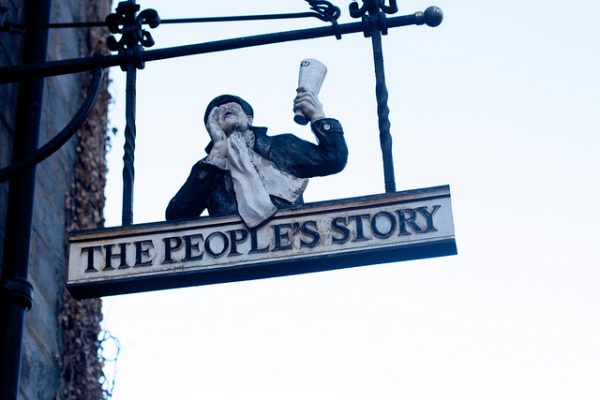
In the wake of the 2016 presidential election turmoil, some groups have turned to storytelling to demonstrate solidarity and to show support for what they see as important issues. In the not-so-secret Facebook group Pantsuit Nation, for instance, members share stories of themselves and others standing up against racism and sexism. Sociologists recognize the power of storytelling in many contexts, especially in building movements for social change by shifting opinions or establishing solidarity, but they also point to some important barriers that come with using stories to change social policy.
Narratives are commonly used to establish a common group identity. For example, public officials might tell stories about a certain group of “dangerous” immigrants, thus establishing solidarity between people in the categories of “citizens,” in opposition to immigrants constructed as “enemies.” Public narratives such as these often follow a recognizable formula with actors who engage in typical behaviors, and plot lines that lead to a predictable moral conclusion.
- Donileen R. Loeske. 2007. “The Study of Identity as Cultural, Institutional, Organizational, and Personal Narratives: Theoretical and Empirical Integrations.” The Sociological Quarterly 48(4): 661-688.
Without people to listen, stories do not go very far. Thus, in order to make progress toward social change, social movement groups must find a way to speak to a broad public audience. Many groups try to gain public attention through protest, in an attempt to attract media coverage. However, news coverage of protests tends to neutralize or undermine their movement’s main issues, and sometimes ignores them altogether. Likewise, much of the news coverage tends to emphasize individual responsibility, rather than systemic explanations for the group’s grievances (i.e. racism).
- Jackie Smith et al. 2001. “From Protest to Agenda Building: Description Bias in Media Coverage of Protest Events in Washington, D.C.” Social Forces 79(4): 1397-1423.
But what makes a story effective in the public domain? Against common belief, sociologists have found that the ambiguity of personal stories makes them particularly effective for public deliberation. Stories that can be interpreted in multiple ways allow others to offer new ideas or compromises without seeming divisive. Conversely, personal stories that work well in value-oriented discussions, like remembering victims of 9/11, are not as effective in policy-oriented settings where reason-based arguments typically prove more effective. This is important because often it is the people with the most privilege (i.e., white, male, native-English speakers) who create these types of narratives, while stories told by people in less powerful social positions often have little traction in the policy realm.
- Francesca Polletta and John Lee. 2006. “Is Telling Stories Good for Democracy? Rhetoric in Public Deliberation after 9/11.” American Sociological Review 71(5): 699-723.
In short, stories are not just about the meaning people convey through or derive from them — they have a social organization of their own, and require certain conditions to be taken seriously.

Comments